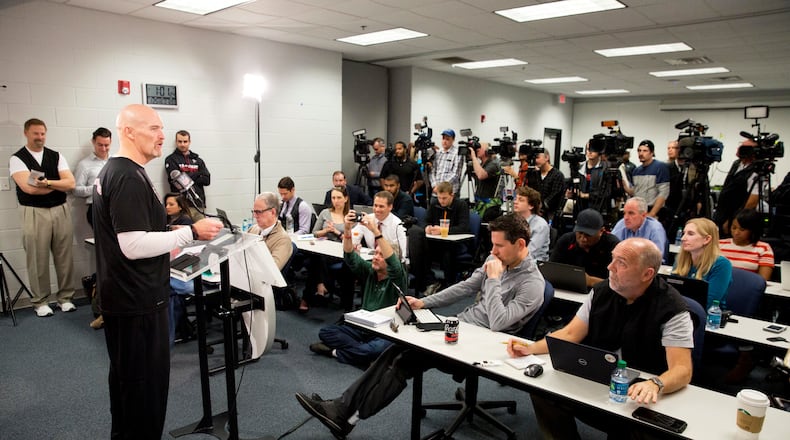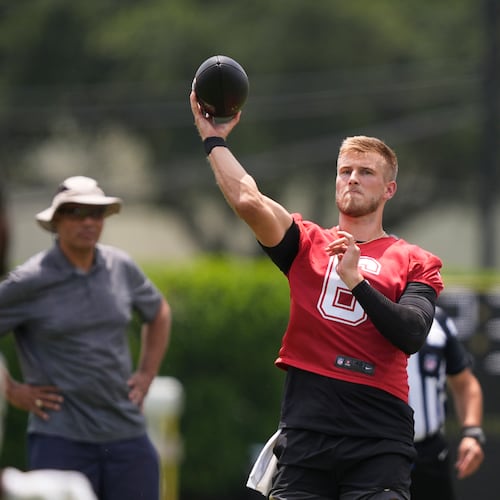There are strategic reasons for Falcons defensive players to meet on their own, without coaches, to study video of opponents. Those functional considerations also fit into the larger themes that coach Dan Quinn emphasizes with the team.
If the players are going to have a “connection with one another,” as Quinn says, they need to be in sync while on the field without coaches. It’s easier to play “fast and physical’ if Falcons defenders have a better idea of what’s coming. They can’t “be about the ball” if they are unsure of where it might go.
The players-only video sessions are about Xs and Os but also serve the team’s style of play.
"We simulate the communication out on the (practice) field but it starts in that meeting room so they can start the dialogue (among) each other," Quinn said. "Those are small things. They don't' show up on the stat sheet, but it's a big part of our culture and what we stand for as players. It definitely helps."
All Falcons defenders take part in the video sessions, sans coaches. But the main collaborators are the players most responsible for communication at each level of the defense: safety Ricardo Allen, linebacker Deion Jones and defensive linemen Jonathan Babineaux and Dwight Freeney.
The player sessions typically take place at the team facility on Fridays before Sunday games. But at times they are held off premises, on personal time.
“Sometimes we can talk about it at the house,” Allen said. “You don’t just watch film. You eat dinner together and all kinds of stuff.”
Falcons defenders believe the extra video sessions are one reason why, after some early struggles, the defense has improved over the past 10 games.
Starting with a week 13 loss at the Eagles, the Falcons have allowed an average of 19.5 points over 10 games (not counting nine points scored by Kansas City’s defense). The Falcons had allowed 28.7 points per game over the first nine.
The Falcons forced 16 turnovers over the last 10 games with at least one in every contest. They had 10 takeaways over the first nine games and didn’t get a turnover in three of those weeks.
The Falcons say they are playing faster now. Quinn said that’s because the communication is better. And Allen said part of the reason the communication is better is those players-only video sessions.
“It’s good to hear what the (defensive) line and the linebackers are seeing,” Allen said. “We are together the majority of the time but sometimes they get a little different coaching. They see something different than what we see in the back.”
The players-only study sessions have been particularly helpful for the many young players on defense.
The Falcons start three rookies on defense: Jones, linebacker De’Vondre Campbell and safety Keanu Neal. Rookie Brian Poole, the nickel back, has played 75 percent of the snaps. Two other starters, linebacker Vic Beasley and cornerback Jalen Collins, are second-year pros.
All of those young players have improved throughout the season. The three rookies, plus Collins, played key roles in the NFC championship victory over the Packers.
Poole twice crushed quarterback Aaron Rodgers on blitzes and Neal knocked running back Ty Montgomery out of the game with a hard hit early in the second half. Collins forced a fumble by fullback Aaron Ripkowski and recovered it in the end zone. Campbell served as an effective “spy” against Rodgers, helping to limit his plays from outside of the pocket.
The young players have learned through experience and coaching, including those study sessions with their teammates.
“Studying opponents, strength and weaknesses, that’s what I do as a veteran and it’s no different for the younger guys,” Babineaux said. “They are in there trying to learn and get some kind of advantage going into the game.”
About the Author
Keep Reading
The Latest
Featured



